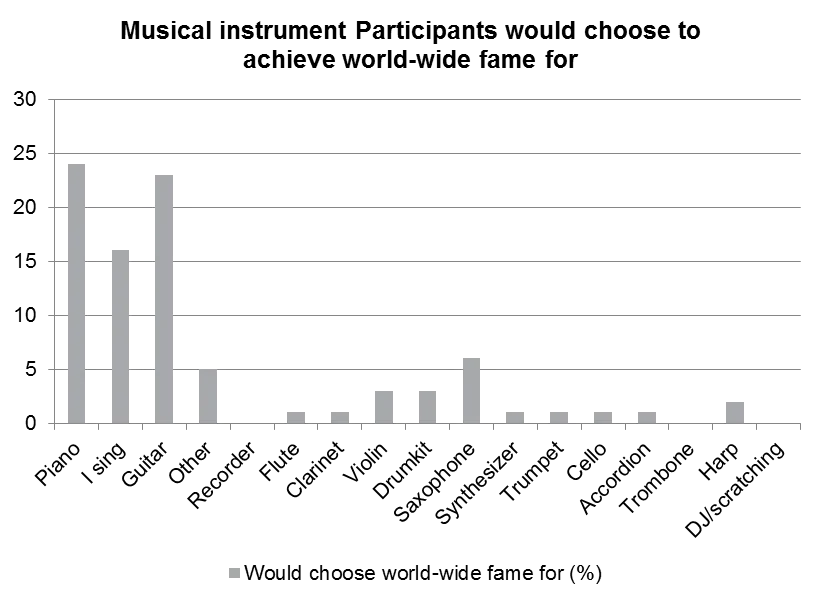The piano is the most commonly played instrument, the most-aspired-to instrument, and pianists the most impressive instrumentalists, respondents to our MusicLab instruments survey have declared. We asked panellists to declare their musicality, along with any musical ambition they may harbour (if at all).
- 47% of those asked in our survey who play an instrument already play the piano, and most of these have done so for over 30 years
- 25% of all MusicLab respondents who took part would most like to learn to play the piano of any other instrument, and have the well-known names Jools Holland, Elton John, Andre Previn, Tim Minchin, or keyboardist Rick Wakeman teach them how
- And finally, if they could be world-class in any instrument, 24% of musicians and non-instrumentalists combined would make themselves master of the black and white keys.
All this implies that learning to play the piano might be the best way forward for prospective musicians – if you have the funds to do so, that is, given that 71% of our surveyed piano-players said they had learned by having music lessons. If you are a bit cash-strapped, however, our findings have flagged up a number of low or no-cost alternatives to get to grips with....
Unsung hero…
42% of the musicians among you were self-professed singers: a veritable chorus. Of this, more than half were self-taught, and staggeringly, 90% had sung in a live performance, either as a solo performer (48%) or as a member of a band (40%). What’s more, across the spectrum of experience, singers would score themselves 8/10 for their skill-set.
 ITV singing show The X Factor’s ratings may have dropped ‒ yet universally, a fantastic singing voice still has the power to dumfound us.
ITV singing show The X Factor’s ratings may have dropped ‒ yet universally, a fantastic singing voice still has the power to dumfound us.
Of the 8% of you who would most like to take singing lessons (if they could now learn to play any instrument) you nominated some stand-out singers as your preferred fantasy music teachers: Aretha Franklin, Ella Fitzgerald, Tim Booth, Katherine Jenkins and of course, the spectacularly popular and recently-discovered talent, Adele.
However, it is worth remembering that the very thing which makes a singer one of a kind also makes them vulnerable, as soul singer Adele has discovered to her anguish. Continued problems with her vocal chords have forced her to stall her UK tour for the foreseeable future.
In an ‘Important Blog’ http://www.adele.tv/blog/352/important-blog to her fans last month, Adele spoke of her vocal problems in relation to how important music and singing is to her: ‘If I continue to pick up everything before I have properly conquered these problems and nipped them in the bud, I will be totally and utterly f****d. Singing is literally my life, it’s my hobby, my love, my freedom and now my job. I have absolutely no choice but to recuperate properly and fully, or I risk damaging my voice forever.’
…Or Guitar Hero?
The guitar came a close second after the piano - whether electric, acoustic, classical or bass - as the instrument most-played by self-professed musicians. 74% of guitarists said they were self-taught, and scored themselves as pretty skilful to boot. Those of you who had been persevering with the guitar for between 6-10 years rated your talents a 6/10. Rock guitar clearly prevailed in your choice of music teacher: if Brian May veers into teaching in his retirement years, he can expect to be fully-booked.
Keeping the beat also seems to be more innate than acquired, according to the drummers who responded to the MusicLab poll. 67% of you have taught yourselves drumming, with skills perhaps perhaps by a combination of online tutorials, school lessons, and outside music tutoring, while 90% of you who have performed have done so with a band.
Among the less-common but self-taught instruments were the synthesizer, and ‘scratching’ ‒ or using turntables. People who play these modern creations said they had largely picked it up themselves, although those of you who use turntables or scratch said you were introduced by a friend or family member, while 17% admitted to using online tutorials as a guide. In live music terms, 100% of ‘DJs’ who have performed have featured as a solo act, even with a broad range of skill rated variously as somewhere between ‘Terrible’ and ‘Excellent’.
Perchance to dream
Witnessing musical prodigy stirs us all, regardless of how musically-inclined or practised we are. And while many MusicLab respondents said they’d never been interested enough to play an instrument, or had stopped learning to do so because they were ‘no good’, had become interested in other things, or were simply bored with it, they still had no trouble summoning up a ready-formed vision of their perfect, albeit parallel-world, performance.

- 26% of all our musically-untrained panellists imagined themselves performing as a member of a band, while 21% would have themselves perform as a solo artist with a backing band
- Most of these non-musicians visualised an atmospheric performance in the Royal Albert Hall
- 14% would scale it up considerably to grace the Wembley arena stage, while 13% would rather play on the main stage at a festival
- And 15% would choose to play at an intimate gig venue
Regardless of your (in)expertise, our findings give a strong basis for widening musical experimentation and participation among respondents. If the idea of performing sends you into rapture, the simple fact is an instrument gives you scope, whether you have genuine musical skill to put on show, or just want to socialise. Away from the music hall or gig venue, there is satisfaction in taking the time out to enjoy something which some would argue has the power to engage the brain and body like nothing else.
Labs Method statement
YouGovLabs research is anecdotal, with polls being open to all panellists who wish to take part. In contrast to YouGov’s Public Opinion polling, YouGovLabs seeks to understand the attitudes of specific subsets of people: sports fans tell us how they feel about sports and music fans tell us how they feel about music, for example. YouGovLabs results are unweighted, and figures reported do not reflect the attitudes of the population as a whole.









